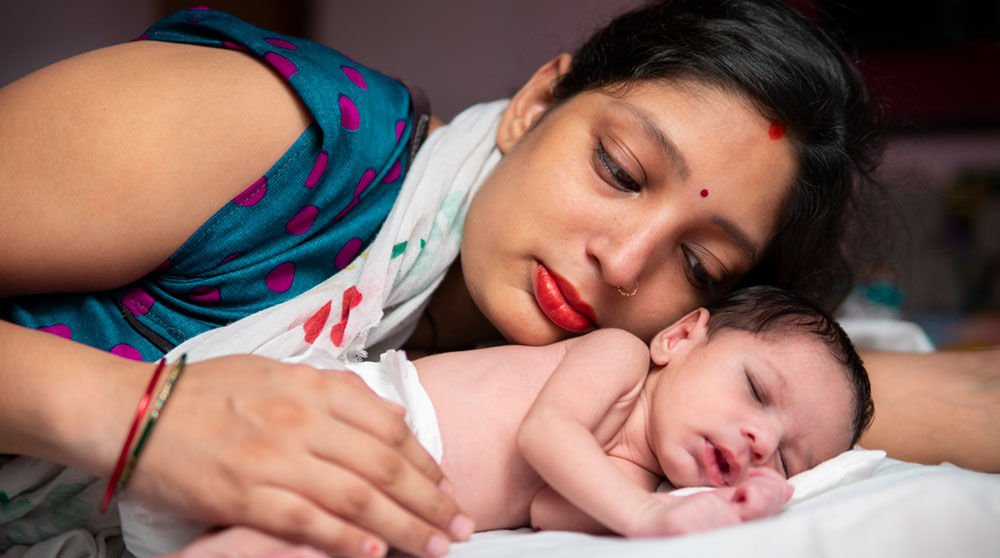
With the scientific standards set by the American & Indian Academy of Pediatrics, there are some mandatory protocols followed by every paediatrician to take care of a new born baby as it comes to the world.
Let’s see what we do routinely when a baby is born.
- Any term baby which cries immediately after birth is put over the mother’s abdomen or chest to establish warmth by skin-to-skin contact and bonding.
- Delayed Cord Clamping (After 30-60 Minutes): It promotes transfer of extra 10-50 ml of blood and nutrients from the mother to the baby.
- Clean (amniotic fluid and blood) and dry the baby. White waxy layer called vernix maintains hydration and protects the baby skin, which can be left until it is shed in the next two days.
- Weight check and head-to-toe examination by a paediatrician to rule out any major anomalies (choanal atresia, cleft lip, cleft palate, spinal defects, imperforate anus and missing umbilical blood vessel).
- vitamin K 1 mg IM is given for all babies born in India.
- If the baby is fine, we dress the baby with a clean 100% cotton cloth and put the baby on the mother’s breast for feeding within 30 minutes to 1 hour of birth to promote early exclusive breastfeeding.
Be Prepared for the Golden Hour:
- Labour is a demanding experience and your first reaction to birth may be a sense of relief that at last it’s over. Give yourself at least half an hour so that the strain of labour fades away.
- As the nurse keeps the baby near you or over your chest, watch and hold your little one. The love and bonding will automatically start building in your brain as well as in the newborn’s brain. A beautiful journey of motherhood begins.
- Breastfeeding the baby within half an hour of delivery is extremely useful as it benefits you by causing your uterus to contract and reduces the amount of uterine bleeding.
- The first hour is best to start breastfeeding as the baby is awake and alert. Soon, the baby will go into a deep sleep and then it may become difficult to start breastfeeding.
Colostrum (Liquid Gold) Is Your Child’s First Vaccine: Your first yellow milk is vital for your baby’s nutrition and protection against infection. The amount of colostrum and milk within the first couple of days may be very less but do not worry. This quantity is sufficient for your child. It will gradually increase in the next week.
After an hour of delivery, your baby will probably fall into a deep sleep, giving you time to rest and giving your family time to celebrate. As a couple, you guys have a very big job ahead of you, you are parents now.
Welcome to Parenthood
Discharge of the baby will be decided by the paediatrician.
Before discharge, make sure of the following:
- Baby is taking breastfeeding properly and mother is confident.
- Baby is not having any medical illness like jaundice.
- Baby has passed urine & stool. (Most of the babies pass urine within 24 hours of birth and pass stools within 48 hours of birth. If not done, then the baby should be evaluated.)
- 0 dose vaccination (OPV drops, hepatitis B and BCG injection) given and next schedule advised.
- Hearing screening has been done.
- Cardiac screening (4 limbs SpO2, 4 limb BP) has been done.
- Detailed clinical examination is done by a paediatrician.
- Weight, length and head circumference of the baby checked and documented in discharge summary.
- Basic metabolic screening (e.g., hypothyroidism, cystic fibrosis, G6PD deficiency). This is optional and done in a few private hospitals.
- Counselling on danger signs in newborn, breastfeeding, newborn home care, vaccination plan and nutrition of the mother.
You will be ready to take your little baby home. Happy parenthood.

Dr D Sivaraman
Associate Consultant – Paediatrics & Critical Care Specialist
Kauvery Hospital Chennai

